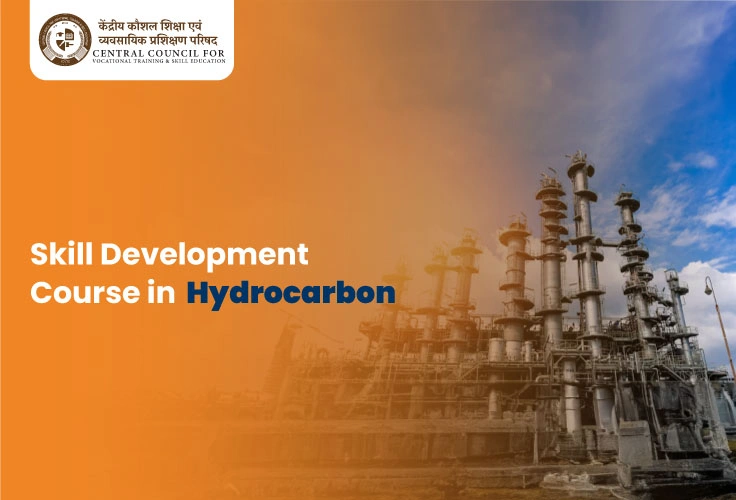- +91 8595350621
- info@ccvte.org
- C4/97B, Keshav Puram, Delhi-110035
Hydrocarbon

Skill Development Program in Hydrocarbon
Hydrocarbons occur naturally. They originate from plant and animal fossils that were formed by the forces of temperature and weight over millennia. They are mostly found deep underground, in porous rock formations, such as sandstone, limestone, and shale. Porous rock formations are often found in large bodies of water, so there is an immense quantity of hydrocarbons trapped deep beneath the oceans. The term hydrocarbon refers to an organic chemical compound that is composed exclusively of hydrogen and carbon atoms. Hydrocarbons are naturally-occurring and form the basis of crude oil, natural gas, coal, and other important energy sources. They are highly combustible and produce carbon dioxide, water, and heat when they are burned. As such, hydrocarbons are highly effective as a source of fuel. Hydrocarbons are chemical compounds that are utilized as the basis of the vast majority of global energy production. A variety of complex technologies and techniques have been developed for extracting hydrocarbons from deep within the earth. Some of the world's largest companies are hydrocarbon companies, primarily oil and gas companies. The use of hydrocarbons as an energy source has negatively impacted the world's climate in a significant way, resulting in climate change.
Why did you choose the Hydrocarbon Course from CCVTE?
Choosing a Hydrocarbon course from a CCVTE offers several advantages:
- Industry-Relevant Curriculum: We provide up-to-date and practical knowledge that aligns with current industry standards and demands.
- Expert Instructors: Our courses are typically taught by experienced professionals and researchers who are leaders in the field, ensuring high-quality instruction.
- Hands-On Experience: Our courses offer hands-on projects and real-world case studies, allowing you to apply theoretical knowledge and build a robust portfolio.
- Networking Opportunities: Enrolling in Our courses we can provide networking opportunities with peers, instructors, and industry professionals, which can be valuable for career growth.
- Certification: Upon completion, you often receive a recognized certification or diploma that can enhance your resume and improve job prospects.
- Access to Resources: Our courses usually provide access to a wealth of learning materials, tools, and platforms that can facilitate deeper understanding and practical skills development.
- Career Support: We provide career support services such as job placement assistance, resume reviews, and interview preparation, helping you transition into the workforce more smoothly.
Specializations in Hydrocarbon
- Exploration and Production (E&P)
- Refining and Processing
- Transportation and Storage
- Environmental and Safety Engineering
- Energy Economics and Policy
- Advanced Technologies and Innovation
- Hydrocarbon Marketing and Trading
- Research and Development
- Project Management
Career Opportunities
- Petroleum Engineer
- Chemical Engineer
- Energy Analyst
- Environmental Consultant
- Reservoir Engineer
- Refinery Operator
- Geologist or Geophysicist
- Project Manager
- Production Manager
Syllabus
|
3 months |
6 months |
1 year |
2 year |
|
Introduction to Hydrocarbons |
Introduction to Hydrocarbons |
Introduction to Hydrocarbons |
Introduction to Hydrocarbons |
|
Alkanes: Structure, Nomenclature, and Properties |
Alkanes: Structure, Nomenclature, and Properties |
Alkanes: Structure, Nomenclature, and Properties |
Alkanes: Structure, Nomenclature, and Properties |
|
Alkenes: Structure, Nomenclature, and Properties |
Alkenes: Structure, Nomenclature, and Properties |
Alkenes: Structure, Nomenclature, and Properties |
Alkenes: Structure, Nomenclature, and Properties |
|
Alkynes: Structure, Nomenclature, and Properties |
Alkynes: Structure, Nomenclature, and Properties |
Alkynes: Structure, Nomenclature, and Properties |
Alkynes: Structure, Nomenclature, and Properties |
|
Aromatic Hydrocarbons: Structure and Properties |
Aromatic Hydrocarbons: Structure and Properties |
Aromatic Hydrocarbons: Structure and Properties |
|
|
Hydrocarbon Derivatives: Halogenation |
Hydrocarbon Derivatives: Halogenation |
Hydrocarbon Derivatives: Halogenation |
|
|
Hydrocarbon Derivatives: Oxidation and Reduction |
Hydrocarbon Derivatives: Oxidation and Reduction |
Hydrocarbon Derivatives: Oxidation and Reduction |
|
|
Hydrocarbon Derivatives: Substitution and Addition Reactions |
Hydrocarbon Derivatives: Substitution and Addition Reactions |
Hydrocarbon Derivatives: Substitution and Addition Reactions |
|
|
Industrial Applications of Hydrocarbons |
Industrial Applications of Hydrocarbons |
||
|
Environmental Impact of Hydrocarbons |
Environmental Impact of Hydrocarbons |
||
|
Hydrocarbon Processing and Refining |
Hydrocarbon Processing and Refining |
||
|
Petrochemicals and Polymers |
Petrochemicals and Polymers |
||
|
Hydrocarbon Exploration and Production |
|||
|
Sustainable Practices in Hydrocarbon Industry |
|||
|
Advanced Topics in Hydrocarbon Chemistry |
|||
|
Capstone Project/Thesis on Hydrocarbons |
Top Hiring Companies
- Oil and Natural Gas
- SLB
- Accenture
- First Student
- Shell
- Tesla
- Amazon
- Reliance Industries
- Equinor (formerly Statoil)
- Occidental Petroleum
- Devon Energy
- Woodside Petroleum
Other Green Jobs Courses Provided by CCVTE
Frequently Asked Questions
A hydrocarbon course typically covers the study of hydrocarbons, which are organic compounds made up of hydrogen and carbon. These courses may focus on the chemical properties, processing, and applications of hydrocarbons in industries such as petrochemicals, energy, and environmental science.
Prerequisites for enrolling in a Hydrocarbon course typically include a high school diploma or equivalent, with a background in science or engineering being highly beneficial. Knowledge of fundamental chemistry and physics is often required, as these subjects are crucial for understanding hydrocarbon properties and processing.
Hydrocarbons are used as fuels (e.g., gasoline, diesel), solvents, lubricants, and raw materials in the production of plastics, synthetic fibers, and chemicals.
Our courses are typically taught by experienced professionals and researchers who are leaders in the field, ensuring high-quality instruction.
Petroleum Engineer , Chemical Engineer , Energy Analyst , Environmental Consultant, Reservoir Engineer, Refinery Operator , Geologist or Geophysicist ,Project Manager ,Production Manager.




